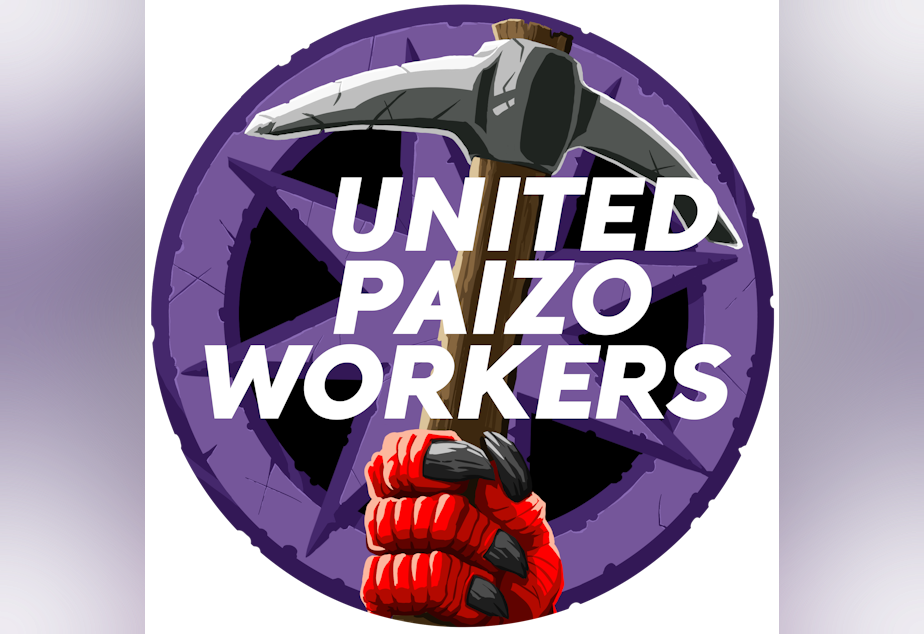Tabletop gaming joins the ranks of unionized workers in Western Washington

Amazon. Starbucks. The Seattle Art Museum. All local companies with workers fighting to unionize.
Add to that list gaming companies.
Employees at Redmond-based Paizo Inc., which publishes tabletop role-playing games like Pathfinder and Starfinder, recently voted to form a union, and the company has voluntarily recognized it.
That's relatively unique in the gaming industry, which doesn't have a history of labor organizing. The Seattle retail store Card Kingdom is trying to do the same.
Members of United Paizo Workers are now tackling the task of bargaining for a contract.
RELATED: Employees at Seattle online Magic peddler push to unionize
To find out more, Soundside reached out to Mark Moreland, director of brand strategy at Paizo and a member of the new union. At Paizo, he has been instrumental in making the games Pathfinder and Starfinder, where players work together to create unique characters and go on adventures, to fight goblins or befriend an orc — basically, collaborating among everyone at the table to tell fun stories, while consulting the rulebooks and rolling a 20-sided dice.
For Moreland, translating that spirit of collaboration was important when looking to form the union.
"The whole point is cooperation and collaboration, and everyone is stronger when they work together," Moreland explained. "There is a strong sense of unity both within the union and with other unions, people trying to build off of each others' experiences and use one another as inspiration."
The union was formed after a long-tenured member of the Paizo staff was let go in September 2021. A member of that employee's team resigned in protest, and other staff members started talking among themselves about how to better protect themselves and ensure their rights. They connected with the Communication Workers of America, announced their intentions to unionize, shortly thereafter the United Paizo Workers was official.
When the word "union" comes up, people often think about workers on a factory floor, or auto workers, or, more recently, Starbucks workers. How would they explain that people who make games for a living need a union, too?
Sponsored
Moreland said it's all about what the national economy looks like right now.
"Thirty or 40 years ago, manufacturing had a much larger footprint within the national economy," he said. "That was that was how you have made a stable life for your family."
But, things have changed.
"We went back to what worked for our parents and our grandparents," he explained. "Let's bargain collectively to ensure we're all getting a fair shake. When these games make money, when they strike a chord with with fans, that the people who are making it, or who are instrumental to the production of those games, are seeing the fruits of their labor."
KUOW reporter Joshua McNichols shared that workers are looking to unionize for quite a few reasons, mostly having to do with the economy. Inflation is hitting everything from gas and food to housing costs.
Sponsored
"But it's not always about money," McNichols explained. "Broadly, this offers people kind of an alternative path to joining the 'Great Resignation' and quitting their jobs. Employees who choose to stay in their jobs or who have to stay in their jobs are demanding more from their employers in return."
And it's not just Amazon workers, Starbucks baristas, or Paizo employees that are fighting to unionize. This trend now includes folks in the cannabis industry, working with the UFCW, and drivers for Lyft or Uber working with the Teamsters Union.
But the most interesting response for McNichols so far has been from Microsoft.
"This proactive stance to say that, 'We'll work with unions,' is significant, because Microsoft is about to buy some companies that may have unionized employees, by the time Microsoft owns them."
And as for where this is all going? McNichols said the unionization effort is moving up the job ladder.
Sponsored
"I keep thinking back to conversations I've had with historians and labor experts over the past year or so," he said. "They look at the erosion of the middle class, and how there has been this increased distance between what people are earning and what's required to thrive in the city.
"Now the line seems to be between people at the top of companies who are making top dollars and big salaries and the many people beneath them that make the ship run smoothly."
Let us know your thoughts on the local labor union movement, share your feedback anytime at KUOW.org/Soundside.





